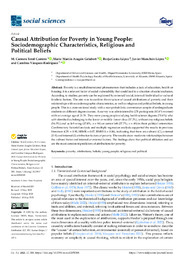Por favor, use este identificador para citar o enlazar este ítem:
https://hdl.handle.net/11000/31277Registro completo de metadatos
| Campo DC | Valor | Lengua/Idioma |
|---|---|---|
| dc.contributor.author | Vázquez Rodríguez, Carolina | - |
| dc.contributor.author | Terol Cantero, M. Carmen | - |
| dc.contributor.author | Martin-Aragón Gelabert, Maite | - |
| dc.contributor.author | Costa López, Borja | - |
| dc.contributor.author | Manchón López, Javier | - |
| dc.contributor.other | Departamentos de la UMH::Ciencias del Comportamiento y salud | es_ES |
| dc.date.accessioned | 2024-02-08T11:25:04Z | - |
| dc.date.available | 2024-02-08T11:25:04Z | - |
| dc.date.created | 2023 | - |
| dc.identifier.citation | Social Sciences 2023, 12(5), 308 | es_ES |
| dc.identifier.issn | 2076-0760 | - |
| dc.identifier.uri | https://hdl.handle.net/11000/31277 | - |
| dc.description.abstract | Poverty is a multidimensional phenomenon that includes a lack of education, health or housing; it is a relevant factor of social vulnerability that could lead to a situation of social exclusion. According to studies, poverty can be explained by external/social, internal/individual or cultural fatalistic factors. The aim was to confirm the structure of causal attributions of poverty and their relationships with sociodemographic characteristics, as well as religious and political beliefs, in young people. This is a cross-sectional study with a non-probabilistic convenience sample of undergraduate students on different degree courses. A survey was administered to 278 participants (45.4% women) with an average age of 21.59. They were young people studying health science degrees (78.4%) who self-identified as belonging to the lower or middle–lower class (57.2%), without any religious beliefs (56.5%) and as left wing (37.8%; n = 94) or center-left (27.7%; n = 69) in their political orientation. Confirmatory factorial analysis and multiple regression analysis supported the results in previous literature (CFI = 0.90, SRMR = 0.07, RMSEA = 0.06), indicating that there are cultural (C), external (E-S) and internal (I) attribution factors of poverty. The results show moderate relationships between the cultural factor and internal or external factors. The findings show that political affiliation and sex are the most consistent predictors of attributions for poverty. | es_ES |
| dc.format | application/pdf | es_ES |
| dc.format.extent | 16 | es_ES |
| dc.language.iso | eng | es_ES |
| dc.publisher | MDPI | es_ES |
| dc.rights | info:eu-repo/semantics/openAccess | es_ES |
| dc.rights | Attribution-NonCommercial-NoDerivatives 4.0 Internacional | * |
| dc.rights.uri | http://creativecommons.org/licenses/by-nc-nd/4.0/ | * |
| dc.subject | poverty | es_ES |
| dc.subject | attributions | es_ES |
| dc.subject | beliefs | es_ES |
| dc.subject | young people | es_ES |
| dc.subject | religious and political | es_ES |
| dc.subject.other | CDU::1 - Filosofía y psicología::159.9 - Psicología | es_ES |
| dc.title | Causal Attribution for Poverty in Young People: Sociodemographic Characteristics, Religious and Political Beliefs | es_ES |
| dc.type | info:eu-repo/semantics/article | es_ES |
| dc.relation.publisherversion | https://doi.org/10.3390/socsci12050308 | es_ES |

Ver/Abrir:
socsci-12-00308-v2 publicado.pdf
769,83 kB
Adobe PDF
Compartir:
 La licencia se describe como: Atribución-NonComercial-NoDerivada 4.0 Internacional.
La licencia se describe como: Atribución-NonComercial-NoDerivada 4.0 Internacional.
.png)